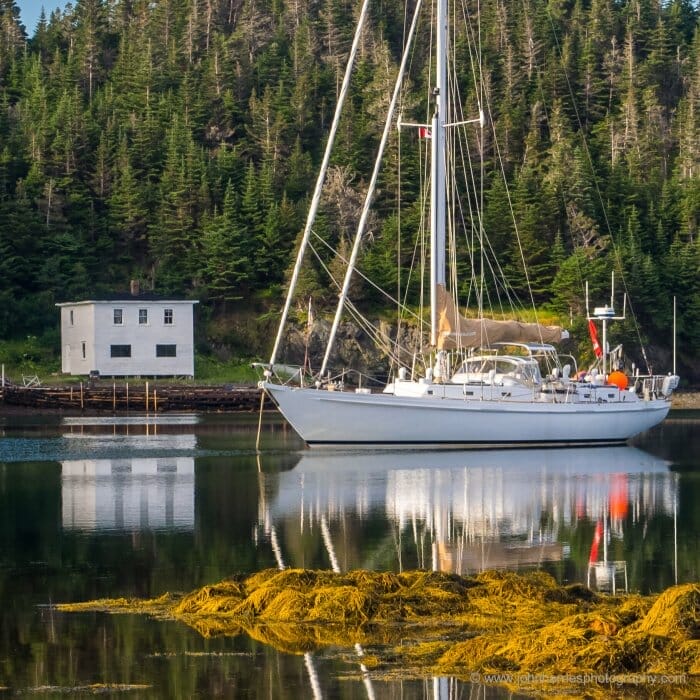
Since we first announced that we were selling Morgan’s Cloud, a number of people have assumed the reasons are that now that we are getting older she is:
- too big for us to handle,
- and/or too much work to maintain.
Nope, and Nope.
Let’s dig into that and then I will share why we are selling:
Easy To Handle
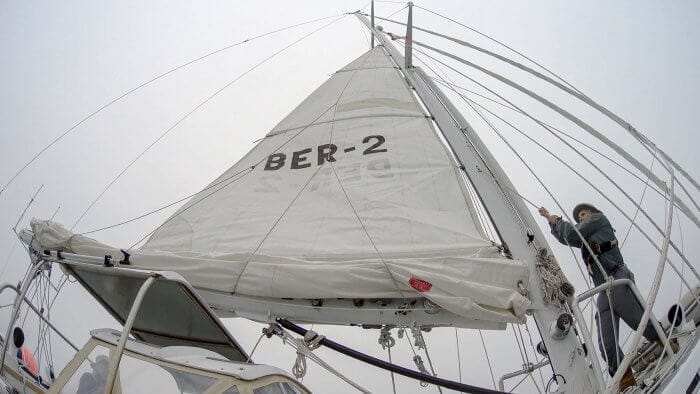
I have written many other places about how we have tricked the boat out to make her easy to handle (see Further Reading), so I won’t repeat all that here, but the key factors are:
- We keep the sail handling systems simple and low friction.
- A larger boat, if properly designed, is a much more stable platform to work, eat and sleep on—you have to experience this offshore to really get it. The result is that not only is the boat pretty easy to handle, we are less tired and better fed than we would be on a smaller boat at sea, and that in turn makes everything easier.
- We have our close-quarters boat handling gear set up and our skills polished so getting alongside is easy.
- We have refined our anchoring gear so it’s reliable and easy to use. For example, some years ago we completely rebuilt the anchor locker so that it stows 380 feet of chain with no manual flaking—just one of the many changes we have made over the years.
Maintenance Burden, Or Not
Phyllis and I fully expect that whatever new-to-us boat we replace Morgan’s Cloud with will be more of a maintenance burden, not less. I know that’s counterintuitive, but it’s true because:
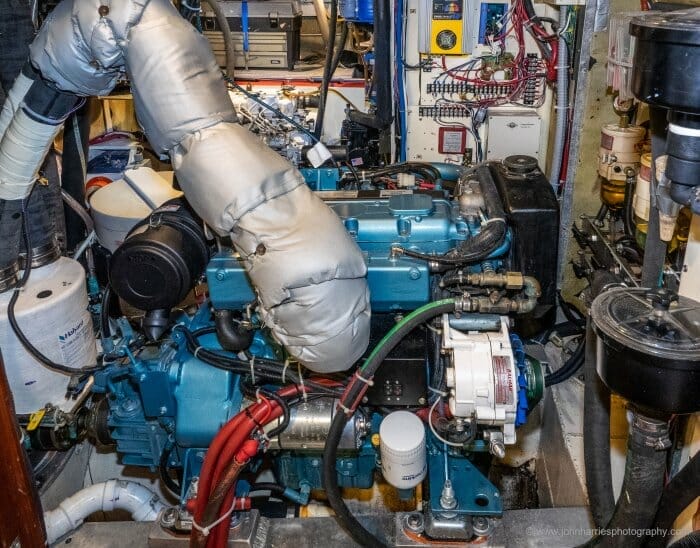
- The effort of fixing something on a boat is reduced in large part if we have great access as we do on Morgan’s Cloud with her walk-in engine room.
- Great access means that we often see problems way before they would be apparent on a smaller boat with gear crammed in tiny spaces.
- The size of the boat enables us to carry a huge spare part inventory—often, more than half of the time and aggravation involved in fixing something on a voyaging boat is sourcing the parts, and that only gets worse in a strange place with no car.
- We also carry a huge tool inventory that we have been upgrading and refining for nearly three decades—we can’t fix it if we don’t have the right tool.
- Having a real workbench right next to the engine room changes jobs that can be real horrors on most boats into easy, or at least way easier, tasks.
- The engine room and work bench arrangement mean that we don’t have to disrupt our living spaces to fix or repair gear. Heck, on smaller boats just doing an oil change makes the boat untenable because the companionway has been removed and there’s stuff all over the salon sole.
- A bigger boat gives us room to install commercial grade gear and machinery.
- We have spent 27 years refining her systems, often to make them both more reliable and easier to maintain.
- Over the years we have removed most of the wood on deck and replaced it with stainless steel (hand rails) and aluminum (toe rails) so there is very little left to maintain.
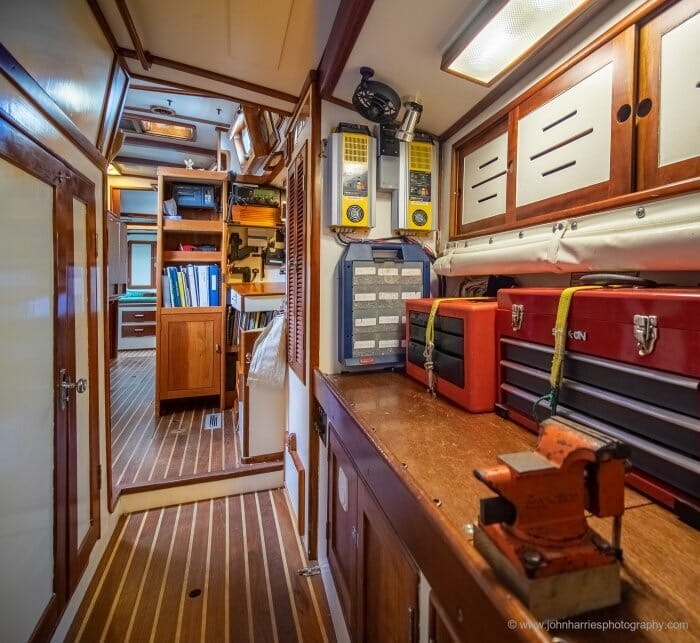
Is It Always This Way?
So, are all bigger boats easy to maintain? Nope, not a bit of it. The two differentiators that make this work are simplicity and decent machinery spaces:
Simplicity
The other way larger boats can be made easy to handle is to add automation to the rig, including electric winches, in-mast or in-boom furling, and electric roller furling, but that’s all complicated and hard to maintain and, worse still, requires bigger batteries and more complex charging systems—and on it goes.
And because bigger boats have more volume, the owner is often tempted to install every convenience of home: washing machine, dryer, ice maker, air conditioning, etc. And that in turn requires a bigger generator and a huge watermaker—and on it goes.
The equation is:
There’s only one type of boat with a worse result for that equation: a small boat with all that stuff—access will, generally, be worse.
In contrast, there is nothing on Morgan’s Cloud that the owner of a simple 40-foot cruising boat would not recognize. Our gear is just bigger…and easier to access.
Just an aside since I mentioned watermakers, because Morgan’s Cloud carries 250 gallons of water (way more than any 40-footer could ever hope to carry) we have never felt the need for a watermaker—one of the most maintenance-needy systems on a boat. Hang out in any harbour where cruisers gather, and you will see the local watermaker tech run off his or her feet…while making a fortune.
Machinery & Deck Gear

The other way big boats become expensive maintenance headaches is by cramming way too much accommodation into the hull, leaving no room for adequate mechanical and/or gear spaces.
For example, if you ever get a chance, check out a Little Harbour 53/54 (a lovely boat in many ways) and ask to see the engine. It’s jammed under the galley in most arrangements, with the generator installed over top of the transmission and driveline, looking for all the world as if the two are having kinky sex—definitely a boat for someone with deep pockets who pays others to do the maintenance.
And, further, the Little Harbour has very little room for deck gear. The result is that ones I have been on have at least one cabin stuffed with gear that should be in the lazarette or forepeak.
No, I’m not running down the Little Harbour 53/54. In fact, I’m a big fan of the late Brown-Thread-Ted-From-Marblehead (as Ted Turner used to call Ted Hood) and his boats. My purpose is only to point out that there are different approaches to bigger boats and that have-it-all has consequences.
Then Why Sell?
So, if Morgan’s Cloud is both easy to handle and maintain, why the heck are we selling her? A bunch of reasons:
Done Cruising
Right from a little boy who devoured cruising books from the Hiscocks, Pyes, and Smeatons, I dreamed of voyaging on my own boat. And, through a combination of hard work and a huge amount of good fortune, I was able to do that for much of three decades, and for Phyllis it’s over two decades.
But when we got back from three months circumnavigating Newfoundland in 2018, Phyllis realized she was done cruising. At first, although I understood, I was disappointed and started thinking about the practicalities of singlehanding and/or taking on crew, but then I realized I was done cruising, too.
The reasons are complex, and best left for another article, but the result is we simply no longer need a boat that is a safe, reliable, floating home for cruises lasting months.
This realization also meant that the motorboat option, taken up by so many aging sailors, makes no sense for us.
But Not Done Sailing
I was a sailor for 30 years before I ever became a voyager: dinghies, culminating in the sublime 505; and small keel boats, including one of the best to ever get wet, the Etchells 22; and nothing has changed. And Phyllis, while not as addicted as I am, has long wondered what it would be like to sail smaller boats.
Morgan’s Cloud, while a truly great sailboat, and one we often sail for a day, or even just a few hours, when going somewhere, is not a boat we, or probably anybody, will regularly take for an afternoon sail just for the fun of being on the water.
Day Sailing
So we want a boat that can be ready to sail 10 minutes after we step aboard, and put to bed in 15.
And, some 20 years after my last ocean race in Morgan’s Cloud, the competitive juices are flowing again, although more for a return to the day racing I enjoyed so much as a young man.
So does that mean we will just buy a simple day sailor? We did think about that, but no.
The Joy Of Being Aboard
We might be done longer duration cruising, but we still both love the simple—and they will be simple on the new boat—joys of sleeping aboard and waking up in a lovely anchorage, something we have an abundance of here in Nova Scotia.
But Not Too Simple
That said, I still love working on Morgan’s Cloud, particularly designing and building simple, but elegant and functional, rigging, electrical and mechanical systems—whipping a new boat into shape should keep me out of bars for years.
Offshore?
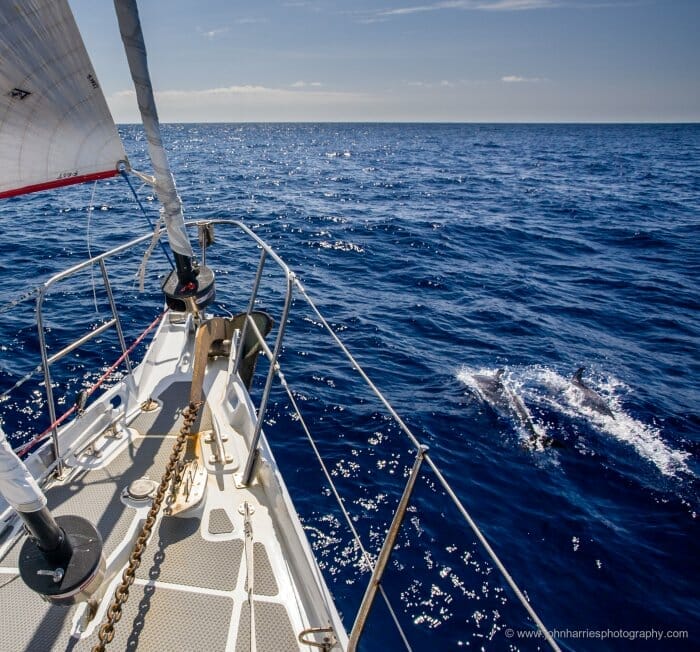
So are we done going offshore? Phyllis is, but I’m not sure. I’m no longer interested in long duration cruising, but an occasional ocean voyage still calls. A lot will depend on my health, which has been a bit wobbly in the last few years. So one of the biggest remaining questions in our deliberations about a new boat is does she need to be offshore capable? Don’t know, but we will share once we figure it out.
Layup and Commissioning
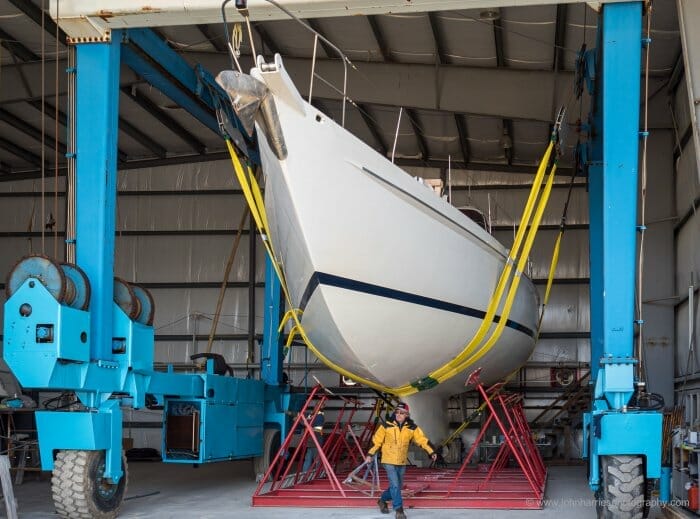
Though Morgan’s Cloud‘s size doesn’t make her any harder to handle or maintain than pretty much any of the boats we are now considering buying, there’s one exception to the latter: fall layup and spring commissioning, which is substantially more and heavier work than it would be on a smaller boat.
Back in the day when we lived aboard fulltime, and unstepped the mast once every three years or so for maintenance, that didn’t matter, but since 2012 we have been laying up every winter, and because we are big believers in the cost and peace of mind benefits of inside storage with the rig out, that’s a lot of work, even though we have it down to a fine art in partnership with our friends at East River Shipyard.
Eternal Vigilance
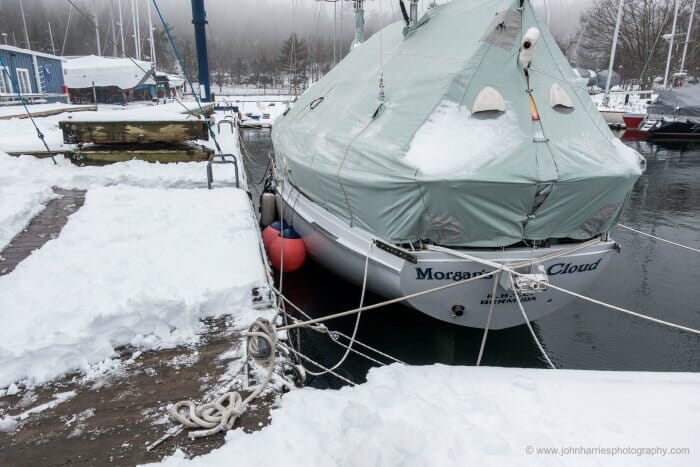
We did consider, and even tried, storing in the water, but the continuing vigilance required by having a boat in the water all year, particularly in our stormy and icy climate is, after 40 years of voyaging boat ownership, getting old—easy when we sailed to relatively benign places like South Carolina and the Bahamas each fall and lived aboard all winter.

And, further, both delivering the boat south (if and when that opens) or keeping her in the water here, interferes with other stuff we like to do, like the annual cross-country ski trip to the Canadian Rockies we have been enjoying for most winters over the last few years.
Summary
There you are, why we are selling Morgan’s Cloud. Not what you thought, huh?
I also think it’s important to be open about being done cruising. In fact, we never liked traditional cruising much, or at least not for very long—more on that in another article.
If that last sentence, or anything else in this article, was a shock, don’t be upset, this is all about how Phyllis and I feel and see the world. I’m not suggesting that there is any virtue in any of the above, or that anyone else should feel or act the same way.
And if you think this article is a thinly-veiled sales pitch for Morgan’s Cloud, you would, of course, be right. But none-the-less, there’s still a lot of useful information above that will help others in choosing the right boat.
The takeaway is that handling and owning a bigger boat of the right type—relatively simple with good machinery spaces—is actually no more difficult than a smaller boat, and can even be easier. And it gets easier still if you live aboard full-time and don’t have to lay the boat up each year.
And further, no matter what size boat you have, or are thinking of buying, if you want a boat with a low maintenance burden make sure she has plenty of machinery space, great access, and simple low friction rigging systems.
Further Reading
- An old fart hoists the main easily in less than two minutes
- Reefing the main easily without in-mast or in-boom furling
- Why we don’t need electric winches
- Another cool alternative to electric winches
- Much more on simple elegant sail handling
- Going alongside made easy
- You may need a bigger boat than you think

I think all of us appreciate your honesty on this, John. It’s tempting, as one gets older, to stick with what we know and love – and are comfortable with – until reality bites us on the ass, backing us into a corner and leaving us unable to explore our options and choices. It’s more difficult, but likely better in the long run, to recognize, admit, and accept that eventually things must change. And then to welcome that change, and make new plans to take advantage of it and the opportunities it offers.
I would be sorely tempted, were I in your situation, to switch it up dramatically: say goodbye to the ocean-going boat, and then say hello to an RV built on a good towing-capable chassis, upgraded with some shorepower-independent battery & water systems, plus a sporty trailerable boat (something like a Dragonfly 28 or F-32). That pairing would open up everything from Great Slave Lake to the Grand Canyon to the Florida Keys, climbing mountains and dodging hurricanes at 55 knots to windward, mostly independent of expensive & boring hotels or RV parks, and capable of leaving most sailing yachts (and a fair number of powerboats) behind when you sheet in the main & jib. It’s not the right fit for me now, at this stage of life, but it’s awfully appealing for later on.
Hi Matt,
Funny you should say that. I don’t think we have any interest in standard RV camping as most people know it, but our circuit of the Labrador highway last fall got us thinking about other ways to have attainable adventures and the gear required.
John and Phyllis,
As a long time follower and advocates, I completely understand. My wife and I handle and crew our Swan 53 with ease in all types of circumstances and conditions, many based on your expert recommendations. At 60 myself we really need to take into consideration when to go for it and when to back off. We have found that now later in life, priorities do change. Our brains tell us go, go, go! and our bodies remind us differently. Maybe me more than my wife. It does ring home a poem from Robert Louis Stevenson
“Under the wide and starry sky,
Dig the grave and let me lie.
Glad did I live and gladly die,
And I laid me down with a will
This be the verse you grave for me:
Here he lies where he longed to be;
Home is the sailor, home from sea,
And the hunter home from the hill.
Now don’t get me wrong, no digging graves just yet, but the reality of our ever changing lives.
Your ever faithful follower,
Jim & Gady
Hi Jim & Gady,
What a loverly comment, thank you! Yes, hopefully not time for a hole in the ground, but given that I’m 9 years older than you, time for a change before it’s forced on us.
Watermaker complicated? Harbor Techs ?
Hi Carlos,
Go to any harbour where cruisers gather and check out the number with watermaker problems. Remember if we are going to have a washing machine it’s going to be a big watermaker.
John. So sorry to hear that you’re swallowing the hook.
While reading your article I couldn’t help but wonder if your choice of cruising grounds had been different would you be making the same decision.
“Circumnavigating Newfoundland”?Rocks,Trees,Cold,Rocks,Trees,Cold etc.
Hey,I get it. NWP popular too.
Imo remote cruising doesn’t have hurt.
Now if family issue are part of one’s decision to quit that is unfortunate, but understandable. I’ve met too many sailors giving up on their dreams because Grandma is getting old or the Grandbabies might not remember them. Sadly the reciprocal doesn’t seem to apply. Tough to get the Kid to fly 4000 mi to visit uncle knowing there will be no access to Facebook Propaganda.
Bonne chance Mate.
As for Watermakers, thank you for making my point. With a watermaker one can avoid harbors and swing on the hook for months on end. ⚓
John & Phyllis,
My wife and I are about the same vintage as you. Our Outbound 46 is “ready to sail 10 minutes after we step aboard, and put to bed in 15” and the systems are not too complex. We part time cruise and day-sail and have no plans to scale down. There is a French couple, currently locked down in Tasmania, who have been circumnavigating in a Django 7.7 – see http://www.intothewind.fr/into-the-wind/ – including cruising the Patagonian archipelago, so I guess it’s more about the people and less about the boat.
Hi Chris,
Yes, it’s always about the people. That’s why when people ask me about the best cruising boat my answer is always “for who?”.
This Django 7.7 experience is a very interesting example of minimalist cruising.
Hey I just replaced my Dana 24 with this:
https://www.liteboat.com/product/litexp/
And moving to expedition-type sailing, getting to the places I love (Maine) at 55mph 🙂
Hi Richard,
Now that looks way cool! A friend of mine is most of the way through building something very similar, although a bit bigger. Looks like he and his wife are going to have a gas with it.
little bit missing here?
“even though we have it down to a fine art in partnership with our friends at .”
Hi Mathieu,
I see “east river shipyard” as linked text. Checked it on a computer, pad, and phone, so I think the missing text is something screwy on your device. What are you using to read the post?
My ad-blocker in FF on Win10 was (not) showing the same thing. Appears fine after disabling the ad-blocker for that page.
that was it. Odd…
Hi Glen and Mathieu,
Sorry, my fault. I had inadvertently copied the Google search string for the boat yard instead of their actual URL. So your ad-blockers, quite rightly, marked the link as an ad, even though it showed and worked fine. Fixed now.
Hello John, excellent contemplation in a world that no longer contemplates!
I’ll be 63 this November and my wife 65… we just completed our first long distance voyage in a new Boréal. 7000 miles … We left France in May 2019 and barely got to and out of Florida to get home to Vancouver before Covid and consequently have had the boat shipped here from Florida. Now we will enjoy her in the relative peace of the protected waters in-shore on the BC coast. (If you are ever out here, please come for a sail and a visit). The adventure cut short, I (at least) would like to do a few more voyages… pandemic permitting … but in the recesses of my thoughts is the knowledge that creeping up, it will be time to downsize and day sail… which I love. I look forward to reading of your process in choosing your next boat. Thanks for all your work and especially for the videos on showing us how to dock properly short handed! Colin helped in teaching us on the Jaudy River in Tréguier. What an awesome technique! … (just one of the mazzillion things I learned from your site… which is also responsible for our purchase of the Boréal).
Hi David,
Great to hear you had a good voyage back and that you are reunited with your boat. And thanks for the kind words.
In fact, I felt much the same way when I decided to sail my PDQ. I was done cruising, at least for now, but I wanted to get out on the water. I wanted a boat that handled well, had enough strings to pull to keep me engaged (I can be a sail trim maven), and that I could get out and put away easily enough to enjoy a short sail. I can overnight if I chose, which I have done, and that is all I want for now. But it’s really about the sailing.
Is the care and maintenance easier? Yes and no. Like Morgan’s Cloud, I had her systems tweaked. But parts for a smaller boat are cheaper and weigh less. The bottom is smaller. Taking a sail off is easier because it weighs less. It fits in the car and and I can work on it in the basement (still partially rolled). The number of steps in most tasks are the same, but as muscles get older, lighter is better.
The only real down side, as I commented earlier, is the quicker motion. It’s not a problem sailing, because you anticipate the motion, or even going forward, because it’s a much shorter trip, but it’s challenging with a bad knee, moving in and out of the cabin or even walking around in an exposed anchorage.
I’m still leaving the possibility of moving back up open. Maybe, if I get bored. But probably not. RV cruising? No, I did enough business travel for two lifetimes.
Hi Drew,
That’s inspirational, thanks. With me, it will be a bad back that’s going to object to moving around a smaller boat. On the other hand said back will be happier when I need to pick up the mainsail. As always, it’s all about tradeoffs.
Good for you guys… it takes courage to admit you have had enough of something you devoted such a huge part of your life to…. and you do have options which makes the decision process more tenable …. just stay healthy!!
Over the 31 years onboard 2nd Chance we have seen a lot of great stuff and I have wondered too, from time to time, to be honest… about ‘what’s next’…. but then I wake up in some remote anchorage, with the sounds of birds foraging and tiny noise of the water rippling against the hull. Or the fresh sea air. Or the sound of rain beating against the deck…. so many things that are so special! I ‘pinch myself’ to be sure it isn’t a dream!!! I feel soooo lucky to have this life! I know that you know what I mean. It takes courage to leave all that behind when it is already so good. … so, good on you guys!
Perhaps it was having cancer in my 20’s that changed me. Perhaps it was struggling with my own business at an early age that changed me. Perhaps it was my profession and seeing what happens to people as they age…. but that is my story…. I can’t see ever really ‘wanting’ to leave this ‘dream’ behind…. time will tell…
I do wish you both all the best. Stay out of the ‘rest’ homes at all costs!
Hi Deven,
Yes, it’s a hard one, but do note that we are not planning to leave all the wonders you detail behined.
Also, even though we plan to have a smaller boat that we can overnight on, there are other ways to get that. For example we now have time to regularly row our 17′ sliding seat (2 up) boat—amazing on a calm morning with wildlife all around.
Also, for us, it’s important to figure out what’s next and position ourselves for it before it’s forced on us by the passing of the years. Nothing sadder than old voyagers trapped on a boat they are no longer strong enough to sail or maintain.
Thanks for the good wishes.
Fortunately if you’re voyaging on popular routes it’s very easy to find good crew.
John,
Is your boat back on the market?
Hi Evan,
Yes, that’s her, and the good news is that Nova Scotia is now open for for visitors, so she can be easily inspected.
The new owner was not able to get insurance for the passage he wanted to do.
Thanks John. That makes sense. I suppose they were using financing to make the purchase which would require insurance – or just couldn’t risk put that large of an investment at risk. I think you’ve covered the topic in the past but it seems like a really important one these days. I think a lot of people (any myself) would be surprised to know what isn’t insurable these days. It’s a topic I’d love to read more about. For example – how much of high latitude sailing just isn’t going to be compatible with insurance coverage? I’m pretty sure singlehanded sailing is almost never covered?
Hi Evan,
We already have a full series on insurance, which includes over 100 comments detailing real world experience: https://www.morganscloud.com/category/passage-planning/insurance/
Thanks John. I’m going to go back through those comments.